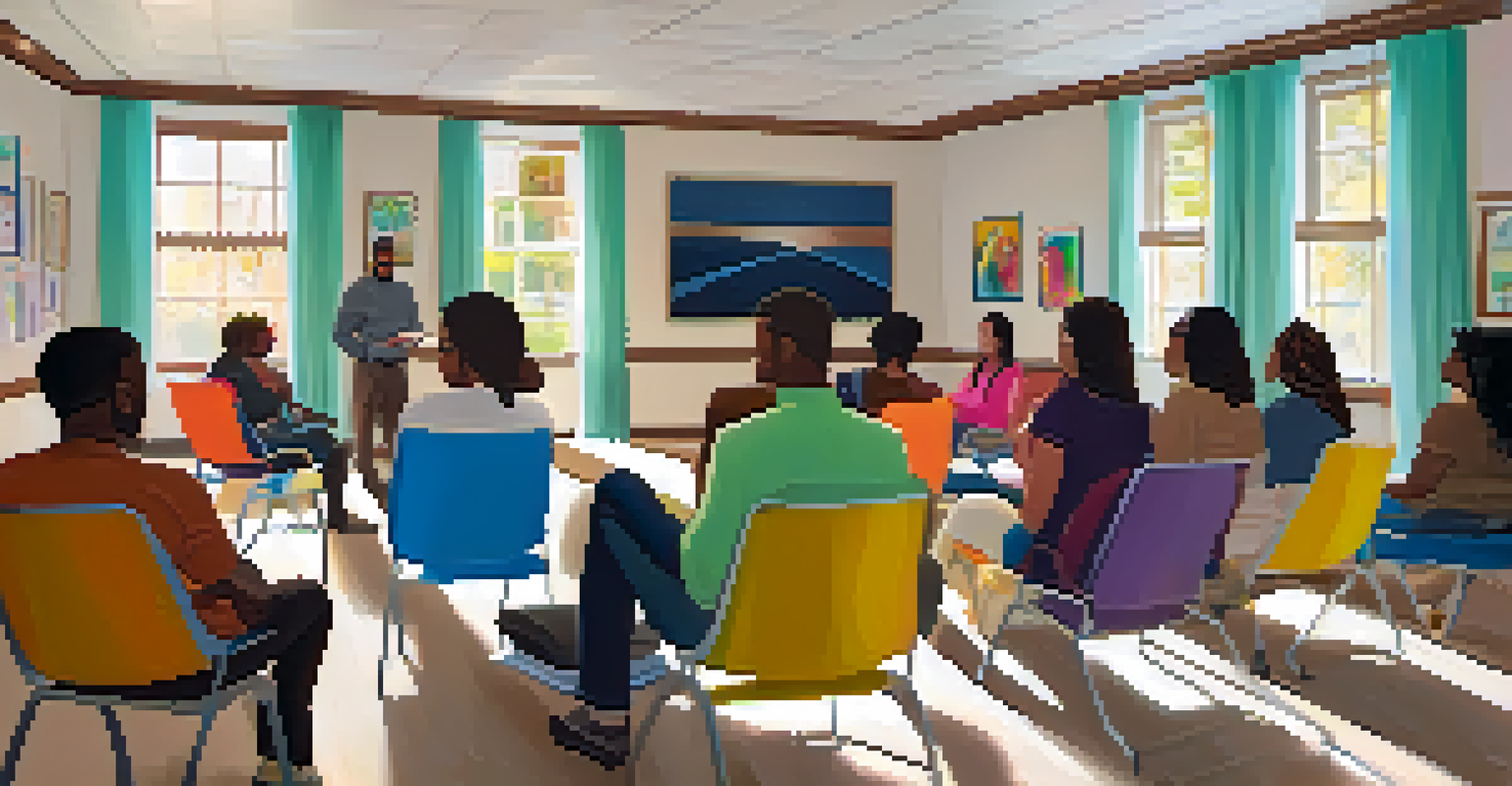Community Support Systems: Building a Stronger Mental Health Network

Understanding Community Support Systems and Their Importance
Community support systems play a crucial role in mental health by providing a network of resources and connections. These systems are made up of various elements, including family, friends, and local organizations, all working together to support individuals in need. By fostering a sense of belonging and connection, these networks can significantly reduce feelings of isolation that often accompany mental health challenges.
The greatest gift of human beings is that we have the power of empathy.
Think of community support systems as a safety net. Just as a net catches a performer who might fall during a circus act, these systems help catch individuals before they hit rock bottom. When people feel supported, they're more likely to seek help when they need it and less likely to experience severe mental health crises.
Moreover, community support systems can provide practical assistance, such as access to therapy, support groups, or even just a listening ear. By promoting open conversations about mental health, these systems help to destigmatize seeking help, making it easier for individuals to take the first step toward recovery.
The Role of Family and Friends in Mental Health Support
Family and friends are often the first line of defense when it comes to mental health support. They can offer emotional reassurance, practical help, and a safe space for individuals to express their feelings. This foundational support is essential, as it can empower individuals to seek professional help when necessary.

Imagine a sturdy tree that provides shade on a hot day; family and friends serve a similar purpose, offering comfort and relief during tough times. Their presence can make a significant difference, reminding individuals that they are not alone in their struggles. These close connections can create an environment where open discussions about mental health are welcomed, fostering understanding and empathy.
Community Support Reduces Isolation
Community support systems provide vital connections and resources that help individuals feel less isolated during mental health challenges.
However, it’s important to recognize that not everyone has access to supportive family or friends. In such cases, community resources can step in to fill the gaps, ensuring that everyone has a chance to receive the support they need, regardless of their personal circumstances.
Local Organizations: A Pillar of Community Support
Local organizations play a vital role in building robust community support systems. They often provide resources like workshops, counseling services, and peer support groups tailored to various mental health needs. By connecting individuals with these resources, communities can create a more inclusive and nurturing environment.
Alone we can do so little; together we can do so much.
Think of local organizations as the glue that holds the community together. They facilitate connections between individuals and mental health resources, ensuring that help is accessible to all. This can be especially important in underserved areas, where mental health services might be limited or difficult to find.
Furthermore, these organizations often collaborate with other community entities, like schools and businesses, to raise awareness about mental health issues. Through events and campaigns, they can educate the public and encourage a culture of support and understanding, ultimately strengthening the community as a whole.
The Impact of Peer Support Groups on Mental Health
Peer support groups are a powerful component of community support systems, offering a space for individuals to share their experiences and feelings. These groups create a sense of solidarity, reminding participants that they are not alone in their struggles. This shared experience can be incredibly validating and comforting.
Imagine sitting in a circle with others who truly understand your journey; that’s the essence of peer support groups. Participants often find a renewed sense of hope and motivation through the stories of others, which can be a catalyst for personal growth and healing. By encouraging open dialogue, these groups help to break down the barriers of stigma associated with mental health.
Family and Friends as First Support
Family and friends often serve as the initial source of emotional support, encouraging individuals to seek professional help when needed.
Moreover, peer support groups can facilitate the sharing of coping strategies and resources, empowering individuals to take charge of their mental health. This collaborative approach not only enhances individual well-being but also fosters a stronger community overall, as members become advocates for one another.
Utilizing Technology to Strengthen Support Systems
In today’s digital age, technology plays an increasingly important role in community support systems. Online platforms and apps can connect individuals to resources, support groups, and even mental health professionals from the comfort of their homes. This accessibility can be especially beneficial for those who may feel hesitant to seek help in person.
Think of technology as a bridge that connects individuals to the support they need, regardless of geographical barriers. Whether through social media groups, forums, or mental health apps, technology enables people to share their experiences, seek advice, and find a sense of community without the constraints of physical distance.
However, it's crucial to approach technology mindfully, ensuring that online interactions complement, rather than replace, face-to-face connections. By blending digital resources with traditional support systems, communities can create a more robust and engaging network that meets diverse needs.
Community Awareness: Breaking the Stigma of Mental Health
Raising community awareness about mental health is essential in building effective support systems. By promoting open discussions and education, communities can reduce the stigma that often surrounds mental health issues. This cultural shift encourages individuals to seek help without fear of judgment or misunderstanding.
Imagine a community where mental health is treated as openly as physical health; this is the goal of awareness initiatives. Through workshops, campaigns, and events, communities can challenge misconceptions and foster a more supportive environment. When people understand mental health better, they are more likely to offer support to those in need.
Technology Enhances Accessibility
Digital platforms connect individuals to mental health resources and support, making help more accessible regardless of location.
Moreover, community awareness can empower individuals to share their stories, creating a ripple effect of understanding and compassion. As more people come forward, it reinforces the idea that mental health struggles are common and can affect anyone, leading to a stronger, more unified community.
How to Get Involved in Your Community's Support Network
Getting involved in your community's support network can be incredibly rewarding and impactful. There are numerous ways to contribute, whether by volunteering at local organizations, participating in support groups, or simply being there for friends and family. Every small action can help strengthen the mental health network in your community.
Think of involvement as planting seeds in a garden; with care and attention, these seeds can grow into a thriving ecosystem of support. By actively participating, you not only help others but also create connections that enrich your own life. It’s a win-win situation that fosters personal growth and community resilience.

Additionally, advocating for mental health awareness and resources within your community can amplify your impact. Whether through social media, local events, or conversations, your voice can inspire others to join the movement toward building a more supportive environment for mental health.